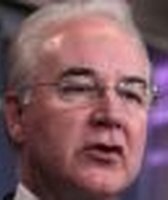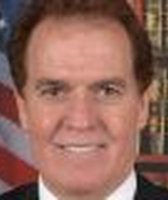Get PolitiFact in your inbox.

Republican presidential candidate Rep. Ron Paul, R-Texas, gestures during a Republican presidential debate on Sept. 12, 2011, in Tampa.
(Editor’s note: With the Iowa caucuses only two months away, PolitiFact Georgia will dedicate this week to summaries of key fact-checks on the leading GOP candidates as well as President Barack Obama’s performance on his 500 campaign promises. Today we look at Ron Paul.)
Want to comment on our findings? Visit us on Facebook.
Every month since 9/11, there have been as many suicide attacks against the United States and its allies as there were in all the years leading up to 9/11.
Paul made this remark Sept. 30 at a forum in Manchester, N.H., to criticize the U.S. for playing "policeman of the world."
Whether Paul meant al-Qaida suicide attacks only or all groups who have executed suicide campaigns against the U.S. and its allies was unclear. Either way, the number of suicide attacks against the U.S. and its allies since 9/11 is not "equivalent" to the total before 9/11.
The average number each month is actually greater than the total number that predated that day, so Paul is actually understating the magnitude. And the data support his underlying point that the number of attacks since Sept. 11, 2001, has grown.
We rate Paul's claim Mostly True.
"When the Republicans were in charge, they actually expanded government health care with the prescription drug program."
Years before "Obamacare," Congress expanded the government's role in health care by adding a prescription drug benefit to Medicare in 2003. Paul made this statement July 16 to the Nashua Telegraph in Derry, N.H., to say the "Part D" drug benefit is a reminder that the GOP sometimes can't resist the temptation of big government.
The Medicare Modernization Act of 2003 was an effort by President George W. Bush. It had roots in previous Democratic proposals, but the version that passed took the Republican approach, experts said.
Republicans controlled both houses of Congress, and the bill passed with strong GOP support
Through 2010, Medicare Part D had cost $203 billion, according to the Congressional Budget Office. It’s expected to cost an additional $391 billion through 2015.
Paul is right on both counts. We rate his statement True.
"The country's bankrupt."
Paul, who has raised warning flags about U.S. debt for decades, made this declaration in an Iowa debate Aug. 11.
OK, we'll bite: Is it?
While ratings agencies have warned that the United States needs to put together a plan to reduce its deficit to hold onto its strong credit ratings into the future, the country so far has paid its bills, which does not match the definition of being bankrupt.
And while S&P lowered its rating a notch, two other agencies still give the U.S. the top grade for its ability to pay its bills. We rate his statement False.
Says members of the military have sent him more campaign contributions than they’ve sent President Barack Obama and more than twice what they’ve sent other Republican presidential candidates.
If he were president, Paul says, the United States would remove its forces from Afghanistan as "quickly as the ships could get there." He made this remark in a July 20 interview with PBS’ "NewsHour" to show how much the troops agree with him.
We turned to the presidential candidates’ latest campaign finance filings compiled by the Federal Election Commission, which breaks out donations by donors’ employers.
We did not achieve accounting-quality math. It’s also possible we missed a donation or two.
But our calculations show Paul’s military-connected contributions for the three months more than double such contributions to all the other Republican presidential candidates -- and they also exceed Obama’s.
We rate his statement True.
Our Sources
See original stories





















































